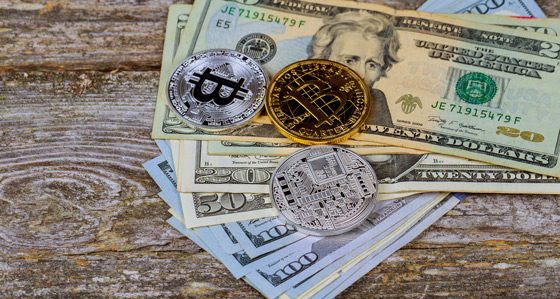
TRUMP SAYS: HUNTER MAKES FORTUNE FROM SHADY DEALS!
BIDEN FAMILY STINKS TO HIGH HEAVENS OF CORRUPTION!
DON'T GET LEFT OUT: HUNTER MUST BE STOPPED!

This report was originally published by Tyler Durden at Zero Hedge

Having explained why central banks are so nervous about cryptocurrencies, it seems the rest of the banking sector is finally admitting the real driver behind their disdain for digital currencies – they are competition and an existential threat.
As CoinTelegraph’s Molly Jane Zuckerman reports, J.P. Morgan Chase has added a segment on cryptocurrencies to the “Risk Factor” section of their 2017 annual report to the US Securities and Exchange Commission (SEC), filed yesterday, Feb. 27.
The annual report mentions cryptocurrencies under the “Competition” subsection when describing how new competitors have emerged that threaten J.P. Morgan’s operations:
“Both financial institutions and their non-banking competitors face the risk that payment processing and other services could be disrupted by technologies, such as cryptocurrencies, that require no intermediation.”
The report notes that these new technologies, evidently including Blockchain, although they don’t mention it by name, “could require JPMorgan Chase to spend more to modify or adapt its products to attract and retain clients and customers or to match products and services offered by its competitors, including technology companies.”
This competition could potentially “put downward pressure on prices and fees for JPMorgan Chase’s products and services or may cause JPMorgan Chase to lose market share.”
J.P. Morgan Chase CEO Jamie Dimon had made waves back in September 2017, when he called Bitcoin (BTC) a “fraud” and threatened to fire any employee that traded BTC on company accounts. Since then, Dimon has backtracked slightly, telling a Cointelegraph reporter at the Davos World Economic Forum that he is not a “skeptic” on cryptocurrencies.
In the beginning of February, an alleged internal report from J.P. Morgan Chase referred to cryptocurrencies as “innovative” and “unlikely to disappear”, also noting cryptocurrency’s potential to be successfully applied to payment system areas that are traditionally problematic or slow, such as cross-border payments.
JPMorgan is not alone, as TruthInMedia.com’s Brendan Weber reports, in Bank of America’s new annual report filed with the U.S. Securities and Exchange Commission (SEC), the corporation largely reflected internally about a number of economic, geopolitical, and operational risks faced.
One of those stated risks is surrounding the increased adaptation of cryptocurrencies, which could have negative effects on the corporation’s earning potential.
In addition, technological advances and the growth of e-commerce have made it easier for non-depository institutions to offer products and services that traditionally were banking products, and for financial institutions to compete with technology companies in providing electronic and internet-based financial solutions including electronic securities trading, marketplace lending and payment processing. Further, clients may choose to conduct business with other market participants who engage in business or offer products in areas we deem speculative or risky, such as cryptocurrencies. Increased competition may negatively affect our earnings by creating pressure to lower prices or credit standards on our products and services requiring additional investment to improve the quality and delivery of our technology and/or reducing our market share, or affecting the willingness of our clients to do business with us.
Increased adaptation of cryptocurrencies also had Bank of America admitting that it may need to make “substantial expenditures” to compete with these rising technologies:
In addition, the widespread adoption of new technologies, including internet services, cryptocurrencies and payment systems, could require substantial expenditures to modify or adapt our existing products and services as we grow and develop our internet banking and mobile banking channel strategies in addition to remote connectivity solutions.
Bank of America might have already taken action to help counter these technologies by banning cryptocurrency transactions on their credit cards.
Additionally, the document stated concerns besides those directly affecting earning potential; they noted that emerging cryptocurrencies could impact Bank of America’s compliance with anti-money laundering regulations:
In addition to non-U.S. legislation, our international operations are also subject to U.S. legal requirements. For example, our international operations are subject to U.S. laws on foreign corrupt practices, the Office of Foreign Assets Control, know-your-customer requirements and anti-money laundering regulations. Emerging technologies, such as cryptocurrencies, could limit our ability to track the movement of funds. Our ability to comply with these laws is dependent on our ability to improve detection and reporting capabilities and reduce variation in control processes and oversight accountability.
Even though cryptocurrencies were a small mention within the entire report, its brief discussion indicated that the company is both aware of and reacting to the further potential impacts of cryptocurrency.

It Took 22 Years to Get to This Point
Two domestic cats have died after drinking raw milk recalled for bird flu risk in California. A...
This article was originally published by Rhoda Wilson at The Exposé. We have all become familiar...
Conservative political commentator Tucker Carlson took part in a wide-ranging interview that was...
Commenting Policy:
Some comments on this web site are automatically moderated through our Spam protection systems. Please be patient if your comment isn’t immediately available. We’re not trying to censor you, the system just wants to make sure you’re not a robot posting random spam.
This website thrives because of its community. While we support lively debates and understand that people get excited, frustrated or angry at times, we ask that the conversation remain civil. Racism, to include any religious affiliation, will not be tolerated on this site, including the disparagement of people in the comments section.


Crypto currencies make work for some people but my guess is it (they- all 1,300 of them) will never be mainstream.
Too many people do not understand how it works and are unwilling or unable to learn something new.
How do you reconcile the sheer number of them: 1,300?
What are they backed by? Full faith and credit? Silver? Gold? Platinum? Nothing?
Grid down, now what?
Now what?
I can sell my “thoughts” about crypto currencies. They are worth about the same. Nothing.
I don’t agree with the part about people not being able to learn something new. I have 90-year-old relatives who are now on Facebook, changing their profile pics, using emojis, the whole works.
“may” work. (may not)
For legal purposes, regulators want cryptos to be like a security or stock.
I ask get-rich-quick schemers, and Barnum-esque suckers, with the money burning a hole in their pocket… what is the strategy.
It works like a stock. There are different ways to speculate. Why is it a mean question.
In general, the strategy was to be a cheer leader. They believe that it grows, indefinitely, based on the trust and goodwill of a fickle public.
The present choice for fed res chair wants money to be chipped, in T’s 5G smart grid, so that every transaction creates a taxable event. Noone is seriously accepting cryptos, for goods or services, until those are converted to cash, above ground.
There is a built in assumption that this occurs:
— after a bank run, when there is no effective fiat currency
— or, in some non extradition country, where you expect connectivity
The insurmountable hurdle, I think, is backing it with some tangible commodity. People would have to put valuables, as well as sweat equity, into their parallel, financial system, until it holds more sway — instead of exchanging worthless notes, back and forth.
Of course cryptos threaten government-printed currencies. For a coupla few reasons. Cryptos value is unstable and no ‘printed’/central bank generated currency can assign a trade/swap value with one because there are no bank-to-bank agreements in place. Don’t forget that the inter-bank lending rate is the most crucial of all interest-bearing debt. Cryptos due to their self-lauded lack of that same government tie have not the ability to be policed in case of fraud, theft or any other financial contagion. The 500 million theft out of the Japanese Coincheck a perfect example of that. Like our fiat currencies there is no real tangible value anymore to any currency; however, cryptos go one better. They have no nation/land/people to back them. One more (there are a lot of reasons one can add), they are indeed totally digital. The servers are just that – machines, computers. Anything that can hack or bring down a machine/computer always has eventually and will. Cryptos can be destroyed outright. Not so with fiats. Simply due to the fact that there are actual printed bills and coins still for all major non-crypto currencies. Trade could continue on a drastically limited basis in such an event. Also, that is why precious metals and/or any other material goods still are the best hedge against any crash, inflation or true loss. All of which current currencies can now purchase at very defined present-day internationally agreed upon values.
Gonna get blasted for this comment, but so it goes. Cryptos WILL be contolled by tptb. Blockchain will be a bit harder, but ultimately more valualble to TPTB. This will enable them to track and monitor all we do. This is the 1988 Economist wet dream prediction taking place in real time. Does anybody really think “we got ’em beat”? Hell, folks, they’re orchestrating this thing. And you’re all falling for it through the one emotion they have a lock on…. GREED!
I ain’t saying what to do, just saying you’re all being manipulated according to social sciences. They know how you’ll react before you know.
In the end, we will be played, we will fall for it and they will reap the benefits through our destruction.